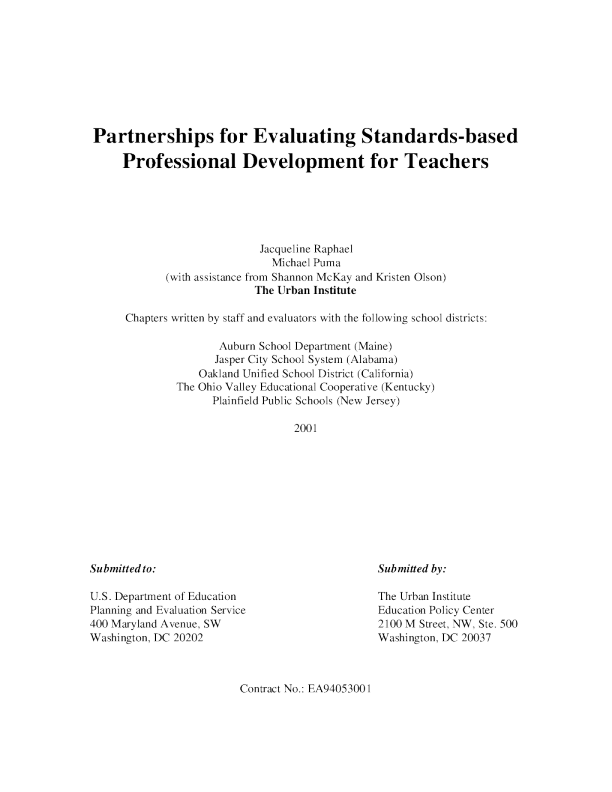Evaluating Training and Professional Development for Home-Based Providers: A Brief for CCDF Agencies and Researchers

RESEARCH REPORT Evaluating Training and Professional Development for Home-Based Providers A Brief for CCDF Lead Agencies and Researchers February 2019 OPRE Report # 2019-11 CENT ER ON LABOR, HUMAN SERVI CES, AND POPULATION Evaluating Training and Professional Development for Home-Based Providers January 2019 OPRE Report # 2019-11 Amelia Coffey and Julia Isaacs SUBMITTED TO Meryl Barofsky, project officer Office of Planning, Research, and Evaluation Administration for Children and Families U.S. Department of Health and Human Services Contract Number: HHSP233201500064I SUBMITTED BY Julia Isaacs, p ro jec t d irec to r U rb an I n stitu te 2100 M Street NW Washington, DC 20037 This report is in the public domain. Permission to reproduce is not necessary. Suggested citation: Coffey, Amelia, and Julia Isaacs. (2019). Evaluating Training and Professional Development for Home-Based Providers: A Brief for CCDF Lead Agencies and Researchers, O PRE Report #2019-11, Washington, DC: Office of Planning, Research, and Evaluation, Administration for Children and Families, U.S. Department of Health and Human Services. DISCLAIMER The views expressed in this publication do not necessarily reflect the views or policies of the Office of Planning, Research, and Evaluation, the Administration for Children and Families, or the U.S. Department of Health and Human Services. This report and other reports sponsored by the Office of Planning, Research, and Evaluation are available at www.acf.hhs.gov/opre. CONTENTS III Contents A ckno w l ed gm en ts iv Evaluating Training and Professional Development 1 Intro duct io n 1 Evaluation Ap proac hes in Rece nt Stud ies 2 Common Resear ch Designs 3 Study Pop ulati ons and Samples 5 Data Collecti on Meth ods and Instr uments 7 Recr uitment Cha llenges and Strategies fo r Engaging Provi ders 8 Conc lusi on 11 Appendix A. Data Sources and Methods 27 Appendix B. Glossary of Research Terms 28 References 31 About the Authors 33 IV ACKNOWLEDGMENTS Acknowledgments This report was funded by the Office of Planning, Research, and Evaluation (OPRE) in the US Department of Health and Human Services’ Administration for Children and Families under Contract # HHSP233201500064I. We are grateful to them and to all our funders, who make it possible for Urban to advance its mission. The views expressed are those of the authors and should not be attributed to the Urban Institute, its trustees, or its funders. Funders do not determine research findings or the insights and recommendations of Urba n experts. Further information on the Urban Institute’s funding principles is available at urban.org/fundingpri nci ples. We ex press appreciation to Juliet Bromer, Diane Paulsell, and E va Marie Shivers for providing their valuable advice and insights. We extend a special thank you to Toni Porter for extensive and thoughtful contributions in the role of senior adviser and to Meryl Barofsky, Alysia Blandon, Teresa Derrick-Mills, and Monica Rohacek for their careful review. Cover image by Tim Meko. Evaluating Training and Professional Development Introduction The 2014 reauthorization of the Child Care and Development Block Grant requires state child care agencies to establish a continuum of professional development “to enable child care providers to promote the social, emotional, physical, and cognitive development of children and to improve the knowledge and skills of the child care workforce.”1 The legislation also requires all providers who care for children receiving assistance through the Child Care and Development Fund (CCDF) to receive preservice and ongoing training in certain health and safety topics. This training requirement extends to all providers ex cept relatives, including small home-based providers who are otherwise exempt from licensing standards in some states. The federal legislation is part of broader efforts to improve the quality of home-based providers, who serve 23 percent of the 1 .4 million children in subsidized care and millions more children in the population at large.2 As state agencies implement and expand training and professional development for home-based providers, now is the time to conduct research and evaluation to inform policy decisions. This brief is intended to support CCDF lead agency staff and others who oversee or conduct such research. You may want to gather descriptive information about provider populations or training programs to support the initial design of training and professional development. It may be time for an implementation evaluation to explore program operations at different sites in your state. You may be ready to conduct a full-scale evaluation to determine the effectivenes




